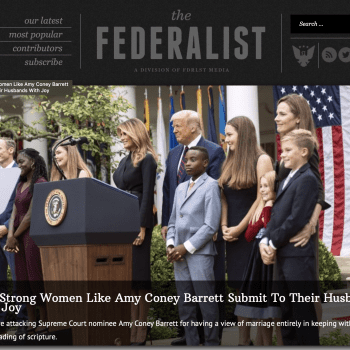I’ve been thinking more and more about how much I appreciate being able to disagree – or, more specifically, being able to disagree without having people flip out.
Growing up on the line between fundamentalism and evangelicalism, in a family influenced by the Christian Patriarchy and Quiverfull movements, disagreement was not allowed. Or to be more specific, disagreement simply did not happen. I have to be completely honest, the first time I learned that mainstream couples are okay with not agreeing with each other on everything regarding religion or politics I was shocked. Coming from my background, that made no sense.
As a child and teen, I never disagreed with my parents, or with my church. Why would I? What we had was truth. When I reached college and began asking questions, my parents and my church had no ability to agree to disagree. Why? Because if I disagreed with them, then I disagreed with truth, and that meant I was flat wrong.
Conservative Christians believe that they have the absolute truth. Further, they believe that those who believe differently are misled or worse, even heretics or bound for hell. Growing up, everyone I knew believed the same thing. If someone had decided to vote Democrat, they would have faced censure. If someone had suddenly announced that they believed God created the world using evolution, they would have been accused of heresy. If someone had declared themselves pro-choice, they would have faced rejection.
This is a big part of why you see churches and denominations split so often. If you hold truth up as absolute, you cannot have disagreements. Churches split over how to hold communion, how salvation takes place, or whether to baptize infants. When your eternal security is at stake, disagreement cannot be accepted.
When you believe you have absolute and final truth, and that having that truth is necessary to keep you from eternal torture and send you to the bliss of heaven, you lose the ability to agree to disagree. You also lose the ability to look beyond what you have and consider other ideas.
This was one of the biggest problems I faced when I started to question the things I’d been taught. Disagreement was not accepted. It was not okay. It could not be tolerated. This put me on a collision course not only with my family but also with the friends I grew up with and the church I grew up in. I had gone from one of them to an outsider overnight.
As I walked away from the pain, I have been amazed again and again by the beauty and freedom of being allowed to disagree. Like I’ve said before, I was no longer expected to stay inside a box. I was no longer being judged, censured. Instead, the sky was the limit.
My husband and I don’t agree on everything, especially when it comes to politics. But you know what? That’s okay. We agree to disagree. Sometimes we discuss a given point of disagreement, each trying to get the other to understand and each trying to understand the other, but sometimes that becomes frustrating and we put it aside. Because you know what? It doesn’t really matter whether what companies like Bain Capital do is good or bad. It doesn’t really matter whether jails should focus on punishing or rehabilitating. It doesn’t really matter. And we know that. Neither of us claims to hold absolute truth – this is a complicated world, after all – so disagreement is okay. And normal. And healthy. Actually, if my husband and I always agreed on everything, I would be a bit concerned.
The other graduate students in my program generally assume that those in the program are politically liberal, but there are some who aren’t, and no one cares. I very much disagree with some of my fellow graduate students on the issue of home birthing, and that’s okay. One graduate student is ardently pro-homeschooling and some are extremely religions, but no one cares because no one expects uniformity. Disagreement is okay, and it is respected.
I love being able to try out new ideas. I love being able to explore. I love being free to disagree. I love not having to face consequences or censure for disagreeing. I love it.














